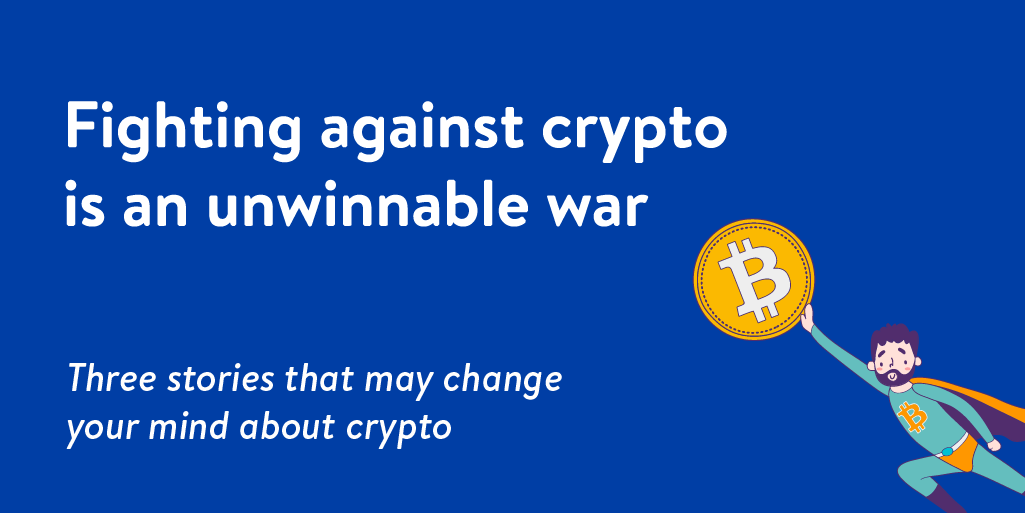
Despite the best efforts of financial regulators and threatened centralised institutions, the war on cryptocurrency seems to be unwinnable.
While cryptocurrencies may have come off the boil recently, there have been a few key events that have presented themselves that would imply they are not going to disappear completely from public view – and definitely not from investor portfolios.
Is it all a Ponzi scheme? Is it enabling criminal activity? Despite the best efforts of financial regulators and threatened centralised institutions, the war on cryptocurrency seems to be unwinnable.
In November 2021 the RBA’s head of payments, Tony Richards, was quoted in an AFR article with the usual concerns raised by institutions that are threatened by the decentralised finance movement. These were shots fired in a war against the perceived evil empire of cryptocurrency.
I too was a non-believer, silently snickering in early 2018 as Bitcoin lost almost half of its value. Since then I started small, and in more recent times there have been some key events that have made me double down on what I believe is a real area of opportunity.
Three stories that may change your mind about cryptocurrency
The CEO of Bitcoin
It must have been during a ‘snap reopening’ we had in Victoria in 2021, around August, when my daughter came home from school and told me that her friend’s mum was the CEO of Bitcoin. Wow, I thought, while Nakamoto Satoshi’s true identity is still up for debate, let’s have a look on Linkedin.
As tends to happen with news from the playground, there was some truth and some over-simplification. It turned out that the parent was a Financial Controller of a publicly listed payment and compliance company that specialised in digital assets.
Why was this significant to me? This was significant because this person had a family, a mortgage, bills to pay, and their livelihood was dependent on digital assets (cryptocurrencies) being the real deal.
Senator Jane Hume tells it how it is
During her address to the Australian Financial Review Super & Wealth Summit (Nov21), Jane Hume was direct and very clear about people who were either ignoring or trying to kill off innovation in decentralised finance – just don’t:
“Don’t be the person who thought the iPhone would never take off because people would prefer to have their music and telephone on separate devices. Don’t be the person who was still doing their financial models by hand in 2001, rather than using Excel.
Don’t be the person in 1995 who said the internet was just a place for geeks and criminals and would never become mainstream.
And don’t be the person who argued that email was a passing fad.”
~ Senator Jane HumeMinister for Women’s Economic Security, Minister for Superannuation, Financial Services and the Digital Economy.
This showed to me that at least some government officials get it and are willing to stand up for what they see as an inevitable area of innovation.
The great rotation
In December 2021 a New York Times article provided evidence of a rotation that was taking place in Silicon Valley. No longer were the prestigious roles at big tech companies such as Google, Amazon and Apple exciting or rewarding enough for the tech workforce.
The entrepreneurial spirit is real, and these visionaries were moving on to where they saw the biggest area of opportunity: blockchain technology:
“There is a giant sucking sound coming from crypto,” said Sridhar Ramaswamy, chief executive of search engine start-up Neeva and a former Google executive, who competes with crypto companies for talent. “It feels a bit like the 1990s and the birth of the internet all over again. It’s that early, that chaotic and that much full of opportunity.”
The keyword being ‘chaotic’ – with many aspects of the new world of decentralised finance (DeFi) and cryptocurrency resembling the wild west where anything goes and with great opportunity also comes great (calculated) risk.
Despite the risks, the percentage of Australians that own some form of cryptocurrency continues to increase and the industry itself locally is expanding.
Ultimately everyone needs to come to their own conclusions. Personally, I hope that we can consider the possibilities of what is new, and not just be scared by it due to it threatening ‘how things have always been done’ – after all, who among us would want to admit that we thought email was just a fad?

